How to Talk to People Even If You Disagree
Updated: Nov. 02, 2023
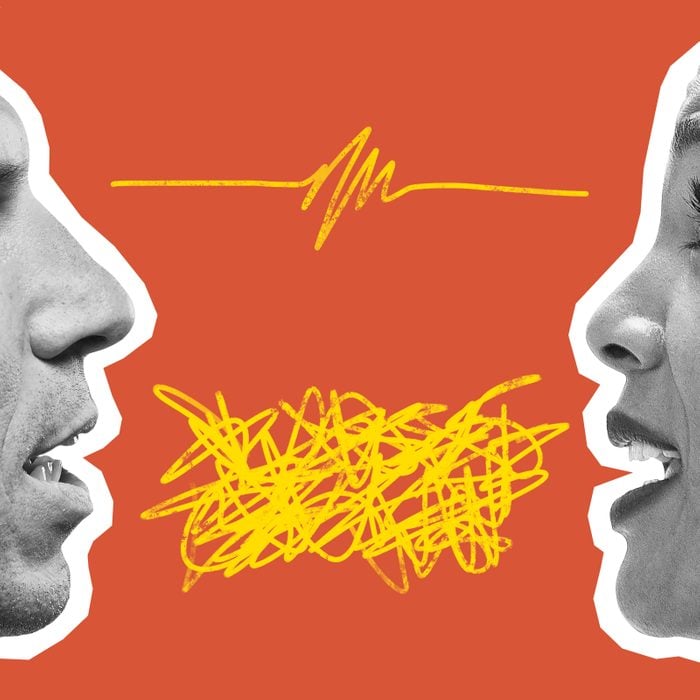
With so much division in our world today, it can be hard to talk to others with opposing views, but this expert weighs in on how you can.
From the book I Never Thought of It That Way
If there’s one thing most people can agree on, it’s that the way we treat and talk to people with opposing views is broken. We can’t stomach the ideas from across the political divide, let alone the people who hold them. This goes for other polarizing topics too, not just politics. In one 2021 poll, most Americans thought the biggest threat to our country’s way of life was “other people in America.” By June 2021, U.S. voters rated “division in the country” as the number one issue facing them personally.
Whether you consider yourself conservative, liberal, something in between, or something off that spectrum altogether, I bet you’ve wondered, as I have, how long we can hold it together while our differences threaten to wreck our relationships, our country, and our ability to share our lives, really, at all.
A political divide
Take poor Barbara in Knoxville, Tennessee, a mother of five grown men whose families got so fired up clashing over politics at her 2017 Thanksgiving dinner, she told me, it was like a bomb went off. One of her sons is very conservative, another very liberal, a third and fourth moderately conservative and liberal, respectively, and a fifth son is more centrist. Yes, really.
“I think my family is a microcosm of the country,” said Barbara, who describes herself as a conservative libertarian Christian. She tried to keep the peace that holiday, begging, “Can’t we just have a nice family dinner?” Instead, some family members wound up leaving early, while at least one daughter-in-law ended up in tears.
Barbara and I connected through our shared determination to find some answer to the challenges these dangerously divided times present in our lives. This is important to me because I work for a group whose mission is to do just that: Braver Angels is the nation’s largest cross-partisan grassroots organization working to depolarize America. I am also a Mexican immigrant and the proud liberal daughter of conservative parents.
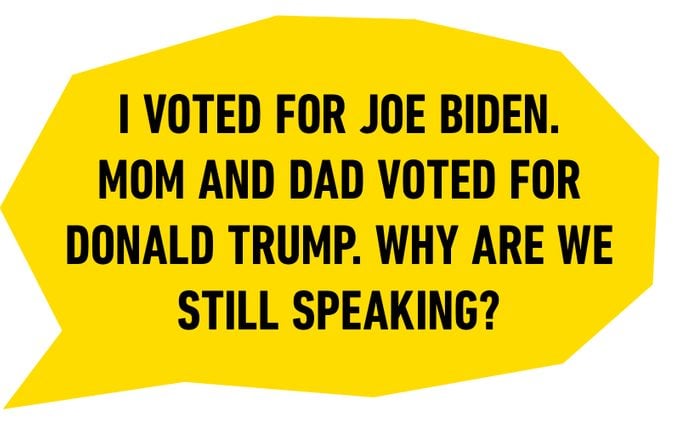
I voted for Joe Biden. Mom and Dad voted for Donald Trump. Each story I hear from Americans of all stripes about the ways that our divides are pulling them apart—the fallings-out, the declined invitations, the tweet-storms, all the ways that people are no longer speaking to people—brings me face-to-face with one question: Why am I still speaking to them?
Even after the tense three-hour conversation about race and law enforcement with Mom, where neither of us changed our minds. Even after the two-hour argument with Dad about how the White House handled the coronavirus pandemic, where I definitely went too far and he was about as mad as I’d ever seen him. Even after all that, and more, why am I not only speaking to my parents but listening to them, learning from them, and enjoying their company? Why am I both eager and afraid to tell my fellow Seattle liberals that I not only speak to my parents, but that I understand them? That if I were them, I would have voted for Donald Trump too?
Ask more questions
I hear people say the answer to all this division is more education and information—but trustworthy information, not that other junk. I hear them say the answer is persuasion, that no conversation is worth having with people who disagree with you if you’re not challenging their ideas and trying to show them where they’re wrong. I hear them say the answer is simple action: Stop yammering and do something to build a more sensible world, ignoring or defeating whoever’s standing in your way.
I say an answer, though it might include all these things, won’t give us what we need. What we need are more questions. As a journalist, I’ve asked a lot of those. I used to be awful at it; I still remember my terror as a kid the day Mom made me march up to the cashier at the Burger King and ask for another packet of salt. What if I sounded stupid? It took all my courage at my first newspaper internship just to pick up the phone and call strangers. My heart would stop when I heard their voices.
But then I fell in love with what they could show me.
Given the chance to ask anything I wanted about who people are, what they do, or what they think, I realized what for years I’d been too petrified to notice: Everybody’s so interesting.
I stopped being afraid to ask questions; I was too impatient to hear the answers. Soon I developed an incurable addiction to people—our stories, our passions, the totally unique way each of us sees the world—and to conversation itself, that unpredictable meeting of minds where individuals with wildly different lives can surprise, delight, and ultimately learn from each other.
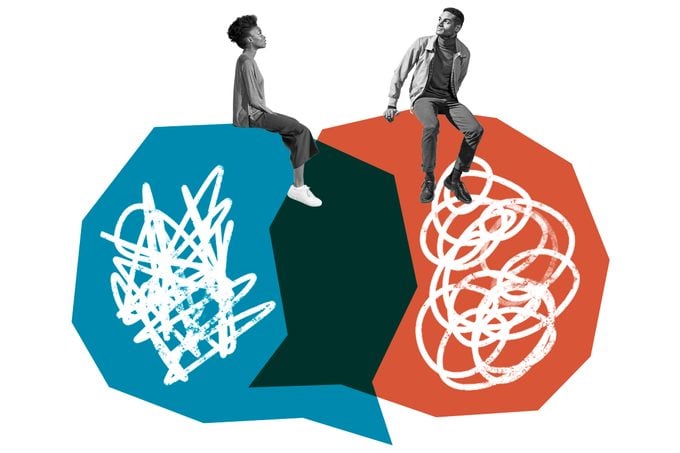
One of my favorite questions to ask in any interview is “Why you?” Why did you start a church in a bar, become your community’s most beloved nurse, or decide to study crows for a living, and not, you know, somebody else? So I guess I should answer that question for myself. Why did I write a book about how to stay curious across divides, and why should you listen to what I have to say about talking to people you disagree with?
If I can sum up the work I’ve done in my 17 years of listening to people professionally, I’d say it’s been one big evolving experiment in how we can better understand each other. I don’t do it for fun, though it’s the most fun I’ve ever had. I do it because connecting with other humans is what makes our lives rich and meaningful. Especially when so much can pull us apart.
In her book The Happiness Hack, my friend, neuroscience educator Ellen Petry Leanse, explains what happens to your brain when you spend a lot of time with folks who reflect your own beliefs back to you. Basically, you stop thinking about those beliefs at all. Your brain likes to stay efficient, take shortcuts, save cognitive power. So as you become entrenched in your beliefs, your brain moves them to a part of itself that’s good at automatic, reactive thinking, and away from the part that reasons things out, ’cause who has the time? As a result, you react to competing beliefs the way you’d react to anything that seems totally unnatural or wrong: with disgust and repulsion.
Touching Stories About the Kindness of Strangers
|
“Our life experience is shaped by our assumptions, biases, and blind spots,” Leanse told me. “We think it’s reality, yet it is only the conditioned perception we have been taught is truth.”
This is great news for groups that are battling it out over their beliefs. Nobody wants soldiers to question whether a threat is a threat. They want them in the fray, sure enough of the cause to hit fast and hard at every opportunity. But if you stop considering other points of view, if even your brain wants you locked in where you’re comfortable, how can you be sure that the group battles you’re waging are justified? And what if you just want to sit at a table and enjoy your family, regardless of what they believe?
Coming from the field of journalism, I feel as if I’m supposed to be rah-rah for information as the cure for everything. But I’m not. I’m tired of us throwing out links and throwing up our hands. Ranting to our people, who get it, while raging at those people, who don’t. I’m done, too, going along with the idea that if we could just rid the world of “misinformation,” everything would be fine. As if mowing down weeds would keep new ones from sprouting. False stories soar because good people relate to something in them that’s true: a fear or value or concern that’s going unheard, unexplored, and unacknowledged. Every time.
One of the best ways to meet people where they are is to ask them where they’ve been. What paths have they walked to get to where they are? What have they seen along the way that changes their landscape, shifts their perspective? Think of the phrase we use almost automatically when some piece of understanding lands with us: “I see where you’re coming from.” I know where you are. I’m there with you.
Listen and learn
To get from Seattle, Washington, to Sherman County, Oregon, you drive east over Lake Washington, up and over Snoqualmie Pass—where your ears might pop—then south, watching mountains give way to quiet hills and plains. You cross the Columbia River into Oregon, pass Biggs Junction and Wasco, then arrive at Moro, the county seat. Population: 353.
Those 250 miles took about five hours to cover one Saturday morning in March 2017, when about 20 of us from the Seattle area made our way toward the Oregon State University Extension Office. Inside, 16 residents of Sherman County were waiting, a bit uneasy, to meet and talk with these urban visitors about the political divisions gripping the country. Most of them had voted for Donald Trump. The travelers from Seattle’s King County also wondered—and worried—about what the day would hold. Most of them had voted for Hillary Clinton.
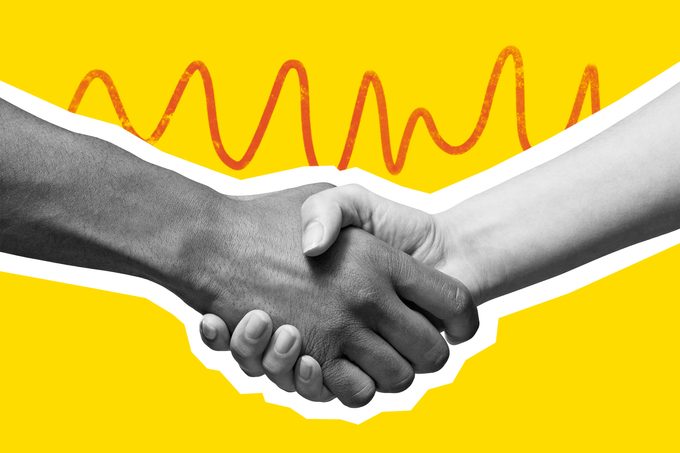
Our visit would begin with a brief bus tour. Just 1,705 people lived within Sherman County’s 831 square miles, and much of that landscape is wheat fields—a bright carpet of beige under the day’s sunny sky.
“What would happen here today that would leave you feeling like this was a good investment of your time?” It was the opening question of the questionnaire I’d helped prepare for the event. If I’d closed my eyes, I wouldn’t have been able to tell which answers came from which county:
“Having a talk with real people instead of all that angry yelling on Facebook.”
“Getting to know people who don’t live like me and don’t think like me.”
“Just learning something that helps me understand a bit better why we’re all so different, because maybe we’re not as different as we think.”
People from the different counties paired off to ask each other questions and listen, without interruption, to the answers. After several rounds of pairings, the room buzzing with tense energy, we brought the big group back together for people to share their thoughts. I’ll never forget when Darren Padget stood up—all six feet, nine inches of him.
Padget is a fourth-generation wheat farmer at a time when the average American is four generations removed from anything approaching that lifestyle. He took a deep breath and gazed at the bits of sandwich crust scattered on the tables from lunch.
“If you knew,” he said in a deep, gruff voice, “what it took to get that simple sandwich on your plate…”
Economic reasons, Padget said, led him to vote for Trump. His health care costs had jumped 426 percent in the past few years, and regulations like the Waters of the United States rule were threatening his business.
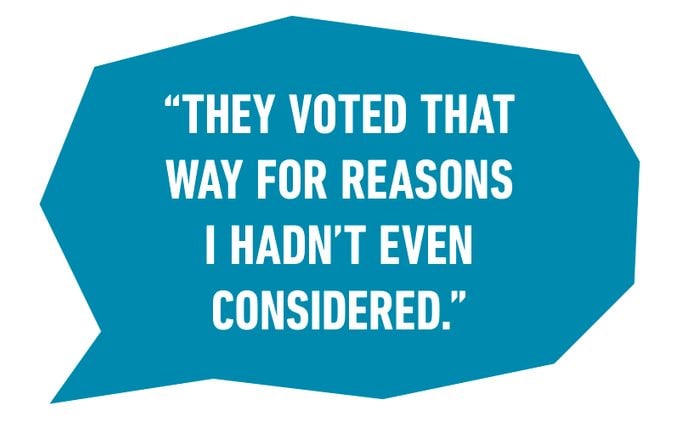
“That’s right,” another farmer said. People from Sherman County nodded while people from King County thought, What the heck is the Waters of the United States rule?
Turns out the rule defines what bodies of water fall under federal regulation, and it’s a big deal. Farmers for years have been nervous about how the rule might be interpreted to cover small, seasonal, rain-made ponds. The rules are complex and confusing, and many of the farmers thought they could better trust Republicans—including the businessman America had elected president—to address their concerns.
That detail was an “I never thought of it that way” moment for Seattle resident Laura Caspi. “It didn’t enter my consciousness that they voted that way for reasons I hadn’t even considered, or for reasons that didn’t matter to me,” she said. “Our lives are so different.”
My favorite photo taken that day was of Caspi and a Sherman County farmer named Fred. In it, they’re giving each other a high five at the end of their conversation—Caspi with blue-tipped hair, Fred with a cowboy hat. She’d been afraid that it would be tough to make this bridge to people who looked at the world so differently, even for a short couple of hours. The topics were difficult and tense. But it wasn’t hard to talk. And that gave her some hope.
“I felt like his granddaughter,” she said.
When our time together was done, nobody wanted to leave. People kept chatting in the conference room, the hallways by the reception desk, and outside under a big sky in a bit of March sun. People traded contact information.
Many good things would follow from this event, which we had titled “Melting Mountains: An Urban-Rural Gathering.” Some people kept in touch, continuing their conversations over email. Liberals and conservatives from around the country would reach out to my partners and me about doing something like it in their states. The trip would be featured in case studies, conferences, and articles.
We had started out with a mountain of assumptions to melt, and while no one is pretending one afternoon is all it took, we showed we could at least get started.
Stick together
At my parents’ place on Election Day 2020, the three of us watched the results of the presidential race stream in on Fox News, then CNN, then back and forth for hours.
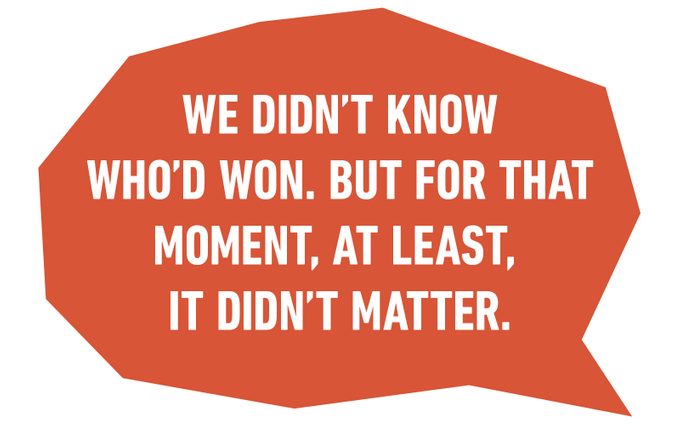
We had our first shouting match, about immigration, over sips of the sangria Mom mixed. We had a bigger one, about race, late into the night, with me standing cross-armed in front of the TV, Mom taking my side for a fun, hot second, and usually reserved Dad leaning forward in his recliner, his voice booming.
“You know, Mónica,” he’d said to me in Spanish earlier that day, “I’ve heard that some people who don’t share their parents’ politics…they stop letting them see their grandkids. And I’ve wondered if that’ll ever happen to us.”
I have two kids, now eight and six years old, and they see their grandparents all the time. My dad’s written songs for them. Songs he plays on his guitar and they memorize, then launch into singing at full volume from the back seat of my Altima.
I didn’t hesitate. “Jamás,” I told Dad. Never. “That’ll never happen, Dad. That’ll never, ever happen to us.”
After all the night’s results had been reported and we had one more political clash about—well, who knows what it was about—I was sitting at their kitchen island eating butter pecan ice cream Mom had served me in the same little gray Tupperware cups I’d used as a kid. By the last bite, Mom had changed into her long red nightshirt. She sat down next to me, patted my hand, and said she was glad I’d come. I was glad I’d come too.
Neither of us knew who’d won, whose views would hold sway in the months and years to come. But I was grateful that for that moment, at least, it didn’t matter.
Keep the conversation open
Building a bridge to the other side isn’t easy, but it’s also likely that it’s not as hard as you think. Take the first step out of your silo, and the gulf you’ve been afraid to span might look more like a gap and feel more like an invitation.
I guarantee that when you are more—and more genuinely—curious, it will strengthen all the relationships that matter to you, whether they’re with your relatives, your colleagues, your country, or yourself.
So here’s your mission, should you choose to accept it: Surprise yourself.
Take one step closer to someone who disagrees with you—whether that means spending time with a friend or relative you’ve been drifting apart from, reading an opinion from an earnest voice on the other side, or sparking a conversation you’ve been both eager and hesitant to have. When you want to explore why they’re wrong, explore instead what you’re missing. When you want to determine whose view wins, determine what makes each view understandable. When you want to discover why someone believes something that confounds you, discover how they came to believe it. When you want to know what their problem is, try to know what their concerns are. When you want to demand why they don’t care about what you care about, learn what they care about more. When you want to trap them into saying what you want to hear, free them so they say what they honestly mean.
And when you want to stop listening so you can react or respond or judge—which will be often!—mind that gap between what you know and what you most certainly don’t, and ask one more curious question. More often than you probably think, you might just find yourself saying “I never thought of it that way.”
Next, read these stories about the touching kindness of strangers that will make you tear up.